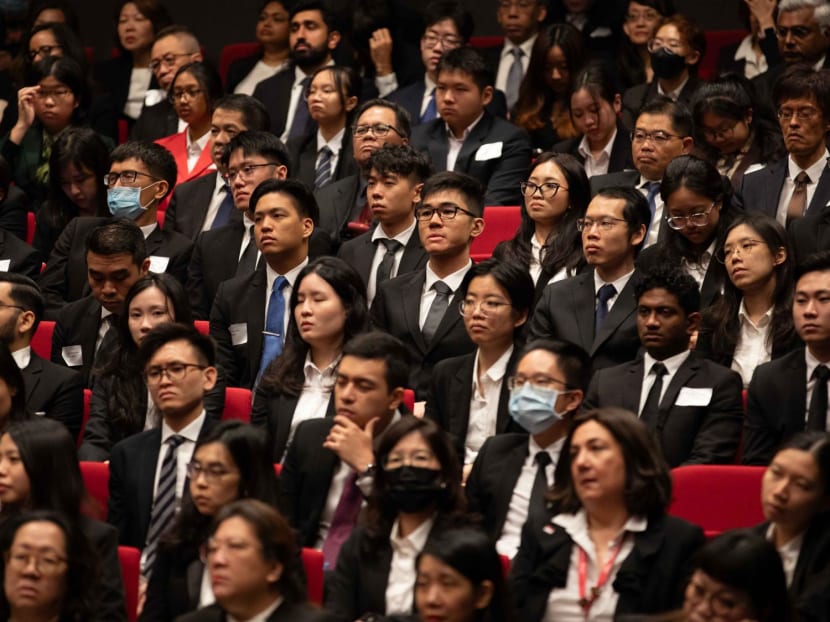Commentary: Ethics training for lawyers has to start in schools — but it can’t end there

Lawyers at the opening of the legal year on Jan 8, 2023.
Chief Justice Sundaresh Menon announced on Jan 8 that more mandatory legal ethics education is on the horizon for lawyers and law students. This has been the subject of public discussion since the 2022 furore over the trainee lawyers who were found to have cheated in the Part B Bar Exams in 2020.
However, the significance of these proposals needs to be understood in the wider context of legal education and legal practice. Education alone is good, but not necessarily sufficient.
First, we need to understand why ethics are so important to the legal profession.
The answer is information asymmetry — lawyers know a lot more about the law than their clients do, and this imbalance gives rise to the possibility of abuse.
Very often, clients are at the mercy of what their lawyers tell them, without any practical way to verify whether the information is correct. This is not necessarily because lawyers intentionally overcomplicate things, but because law is inherently a complex discipline.
This is why lawyers, like doctors, need to be regulated by their own profession, who do understand the issues at stake.
Legal ethics already are part of legal training. However, legal education is a long journey with many stages.
At present, not all law schools offer ethics as a core module of study. At the Singapore University of Social Sciences (SUSS), Legal Ethics are part of the compulsory curriculum for Year 1 law students.
However, this is not necessarily the case in other universities, especially overseas universities which, even if they have ethics training, may have very different ethical rules.
It is only sensible that this ecosystem be looked over and gaps plugged to ensure that all lawyers, no matter what pathways they take into practising law in Singapore, have adequate ethics training.
But that cannot be the end of the story.
REAL LEARNING
There are generally two kinds of wrong-doers: Those who don’t know what they are doing is wrong, and those who do.
The changes announced by Chief Justice Menon may be helpful in reducing the number of unintentional ethical breaches. Young lawyers are often overwhelmed with the pace, volume and complexity of legal work, and may unintentionally overlook ethical issues. It is therefore good to sensitise them to such problems at an early stage.

Repetition is key to learning, and importantly, to retention. It is good that ethics will be taught not only at undergraduate level, but also as part of Continuing Professional Development. Often the real lessons can only be learned once a student has sufficient practical experience to appreciate how the ethical issues impact the practice of law.
In their final year, law students at SUSS participate in a capstone programme which sees them embedded with real law firms, the courts, or the Attorney-General’s Chambers. Students get an opportunity to not only put their content knowledge to use, but also become sensitised to the daily realities of legal practice.
It is all very well to study ethics in the abstract; our students soon realise it is quite a different thing when there are clients and bosses and deadlines to satisfy.
In this regard, ethics training at the law-school level could be a good opportunity for further collaboration between academia and practising lawyers. Ethics cannot be taught as an “ivory tower” subject, and students need to hear and learn directly from people who have been in the trenches.
The problem will be to find space for such training in an already packed law school curriculum. Something has got to give — it is not as though law students have a lot of free time into which an entirely new subject can be squeezed.
If ethics are to be a priority in law education, conscious decisions must be made to scale down content in other areas of the curriculum, which is going to be a challenge as no one likes to have their own subject cut down in favour of another.
The Standing Committee mentioned by the Chief Justice will have its work cut out for it, as there will be acute trade-offs to be made.
CARROTS AND STICKS
However, the new training proposals are not a magic bullet. They are not likely to help at all with those who know what they are doing is wrong and do it anyway. As much as we would like to believe that law is a profession and a calling, there are always those who cynically perceive it only as a money-making endeavour.

Traditionally, in regulation, there are two options: “carrots” and “sticks”. In legal regulation, we tend to take a sticks approach, disciplining errant lawyers when they are reported to the Law Society. But such an approach is fundamentally reactive — there may be cases which are never reported, and offenders who are never detected.
This is especially a problem for a profession like law, where information asymmetry is high and clients may never even understand that they have been taken advantage of. That is not to say we should not rely on sticks at all — only that we should not rely on sticks exclusively.
We need to start thinking about carrots. More needs to be done to understand what might cause lawyers to intentionally violate their ethical codes — pursuit of profit, fear of failure, and so on.
Structural factors that tempt lawyers and law students to cut corners need to be addressed in a way that both reduces their incentives to be unethical and increases their incentives to be ethical.
The carrots approach lays the foundation for a self-regulating system, as opposed to sticks, which requires enforcement. This could be a good opportunity for lawyers to work with other disciplines in social sciences, business and behavioural design to create a better system of checks and balances.
To sum up, education is a vital part of the solution, but not the whole solution.
We have to consider not only to those who are ignorant of ethical risks and concerns, but those also who wilfully choose to be unethical. This is a systemic design issue — one we can address by, yes, inculcating good values in young lawyers, but also by building a robust system that creates incentives for ethical behaviour and deters bad behaviour.
ABOUT THE AUTHOR:
Alexander Woon is a lawyer with RHTLaw Asia as well as a lecturer at the Singapore University of Social Sciences, School of Law.






